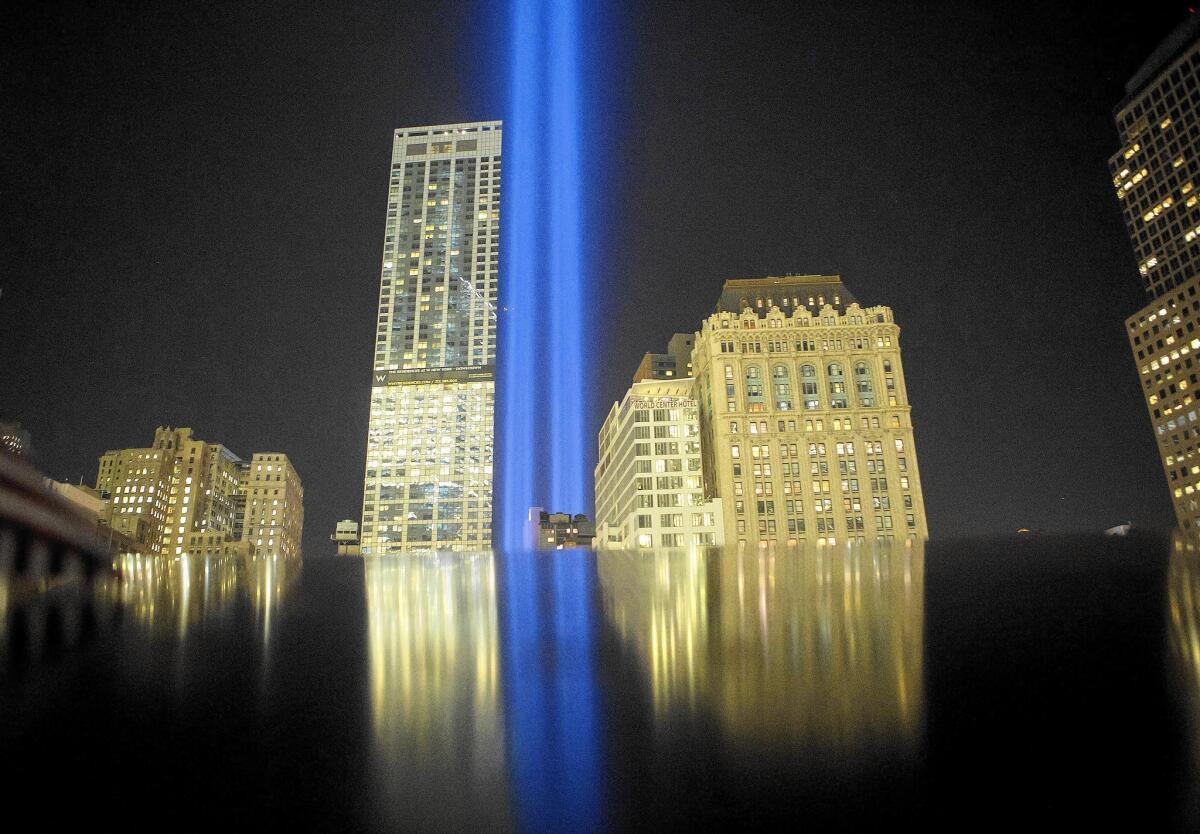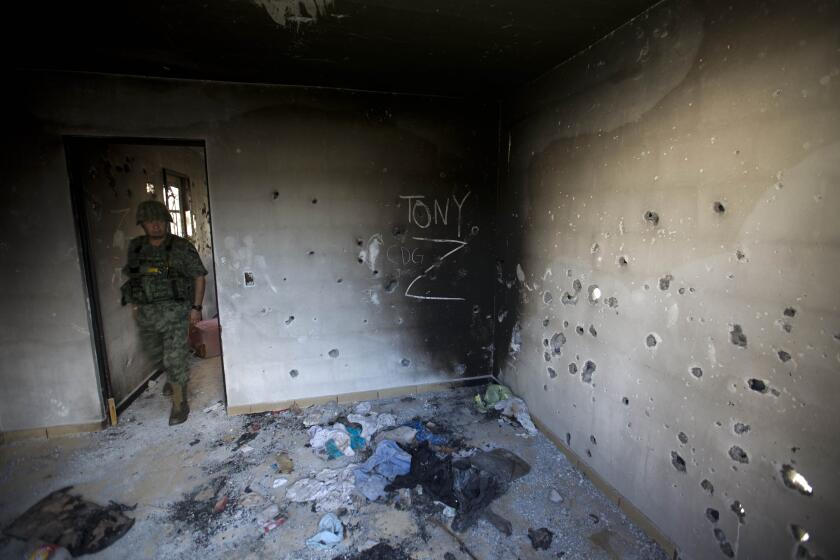Americans express ambivalence over a new Mideast military plunge

As the afternoon sun blazed down on the 9/11 Memorial, Derek Cooper weighed another U.S. military plunge into the Middle East.
“It’s hard to say we shouldn’t be the world’s police, but at the same time, how would the world be if we weren’t?” asked the 32-year-old visitor from Vacaville. “I think a lot of times, we should keep our noses out of the business going on in the world. We’ve been in the Middle East one way or another for this long. What have we really accomplished?”
Going back and forth with himself in the shade near the memorial’s twin reflecting pools, amid a scattering of yellow roses and other tokens to the departed, Cooper gave voice to a widely shared ambivalence as the country reluctantly, resignedly faces a new battle in a war seemingly without end.
The fight against the terrorist group Islamic State evinces little of the righteous anger that followed the Sept. 11 attacks, much less the gung-ho fervor that swept the nation after the bombing of Pearl Harbor.
Rather, there is wariness and the weary sense of approaching a task with little choice and no sense it will turn out well, whatever assurances President Obama gave as he announced stepped-up military action against the terrorists who have beheaded two American journalists. (The group posted a video Saturday that appeared to show the beheading of a British aid worker.)
“Even if we succeed in degrading and eventually destroying ISIS, the discontent and radicalism of the Sunnis who make up its ranks will simply morph into something else,” said Stephen Clutter, a retired Air Force colonel in Phoenix, using one of the acronyms for the extremist group.
In Houston, Bonnie Canter pretty much agreed. “This democratization of the world — when do we stop trying to make everybody like us?” asked Canter, 54, as she left a lunch spot in the city’s hipster Montrose neighborhood. “We’ve had boots on the ground, and here we are again.”
Opinion surveys have shown a drastic shift in public opinion, with the country growing more supportive of at least some level of military action overseas, especially after the videotaped killings of journalists James Foley and Steven Sotloff. A Washington Post/ABC survey found that support for airstrikes against Sunni insurgents had soared from 45% in June to 71% in a poll released last week.
But dozens of random interviews across the country, in red states like Texas, blue ones like New York and purple states like Iowa and Nevada, turn up far more nuance than the surveys might suggest, along with contradictions — like Clutter’s support for airstrikes against Muslim extremists even as he downplayed the danger they represent.
“The so-called threat to our homeland by ISIS is more hype and hysteria than reality,” said Clutter, 55, who served 29 years in the Air Force, including three tours in Afghanistan and one in Iraq, before retiring in July. “Americans are in more danger of being killed as a result of drug cartel violence, drunk drivers or defective GM parts than by an ISIS attack.”
There are, of course, people dug in on both sides of the issue, some favoring an unstinting attack, others believing it is best to do nothing at all.
“We know where the snakes are and where the head is at,” said John Fennych, 66, who commands a Veterans of Foreign Wars post in north Las Vegas. Between fielding calls for a wrestling-themed fundraiser, he paused to pillory Obama, for what Fennych sees as timidity, and the Islamic State, for its twisted hatred.
“We have to take them out now,” Fennych insisted. “We can go in there and bomb them and in 48 hours kiss them goodbye. I know there will be civilian casualties; that is a cost of war.”
Brad Mowrey, by contrast, said aggressive U.S. action would only breed anti-Americanism and more terrorists.
“There is no military solution to this,” the 51-year-old videographer said as he chained his bicycle outside the downtown library in Iowa City, Iowa, on a cold, rainy afternoon. “Sending in airplanes to bomb people is never a good idea and it’s always a last resort, but it seems to be the first choice that Americans make.”
Inevitably, partisanship colored some attitudes; the transcendent, nearly universal rallying around President George W. Bush in the days and weeks after Sept. 11 seems almost quaint in retrospect.
Mowrey, a Democrat, criticized the Bush administration for “getting us involved in a hugely mistaken war,” giving rise to the Islamic State and other extremist groups now seeking vengeance against the United States.
In Los Angeles, Itzchak Cohen blamed the terrorist upswing on Obama, whom he never voted for. “It’s like that old saying, ‘Walk softly and carry a big stick,’” said Cohen, 65, sitting outside downtown’s Grand Central Market. “Obama is walking loudly and carrying a small stick.”
Mostly, though, attitudes arose from something other than party philosophy. Democrats, Republicans and the apolitical alike expressed a mix of anger, frustration, disappointment and, above all, certainty that very little will ever change in the Middle East, a caldron of ancient hatreds and inexplicable feuds. Far better, many suggested, to leave people there to solve their own problems.
“I’m not going to go over to Kentucky because the Hatfields and McCoys had a fight,” said Rodney, a 49-year-old contractor and Army veteran in Coralville, Iowa, who declined to give his last name. “If we didn’t have boots in the desert, would we have boots being kidnapped?”
In Seattle, Kathie Moritis agreed. The Middle East “is going to have to sort itself out,” said Moritis, who was visiting the city’s stinkiest attraction, a rare blooming “corpse flower” at the Volunteer Park Conservatory.
“Borders may shift,” the 65-year-old retired dental hygienist said. “People will die in the process. It’s not going to be pretty.”
But America, she went on, must “spend some time on our own issues: infrastructure, financing health care, helping students pay off their enormous loans.”
Neither expressed particular concern about an Islamic State attack in the United States.
Back at New York’s 9/11 Memorial, amid a tourist medley of foreign languages and the water flowing where the World Trade Center towers once stood, Jay Reynolds said he was glad Obama was more directly going after Islamic State terrorists, even though he has a son in the Army Special Forces and believes the conflict will soon escalate from bombing to a ground invasion — never mind the president’s promises.
“When you put your hands on us, we’re coming,” said Reynolds, 50, a hospice worker in Vicksburg, Miss. The site where he stood reminded Reynolds that the U.S. could have acted sooner to fight Osama bin Laden and Al Qaeda but didn’t.
As for his soldier son, Reynolds said, he’ll keep him in his prayers.
Semuels reported from New York City and Barabak from Iowa City and Newton, Iowa. Staff writers John M. Glionna in Las Vegas, Molly Hennessy-Fiske in Houston, Maria L. La Ganga in Seattle, Maeve Reston and Ruben Vives in Los Angeles and David Zucchino in Durham, N.C., contributed to this report.
More to Read
Sign up for Essential California
The most important California stories and recommendations in your inbox every morning.
You may occasionally receive promotional content from the Los Angeles Times.












